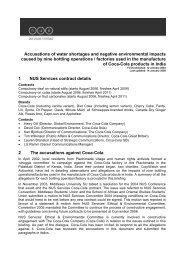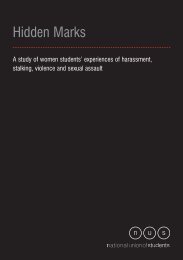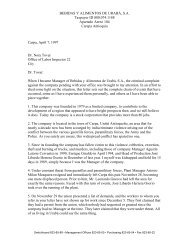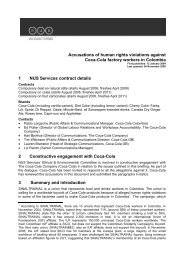No Place for Hate Crime - National Union of Students
No Place for Hate Crime - National Union of Students
No Place for Hate Crime - National Union of Students
You also want an ePaper? Increase the reach of your titles
YUMPU automatically turns print PDFs into web optimized ePapers that Google loves.
<strong>No</strong> <strong>Place</strong> <strong>for</strong> <strong>Hate</strong><br />
4. Establish multi-agency, joined-up approaches to tackling<br />
hate<br />
Colleges and universities should work to establish<br />
partnerships with local police authorities, voluntary<br />
sector organisations and authorities to develop a crosssector<br />
strategy to reduce hate within, as well as outside,<br />
the institution.<br />
5. Strengthen existing support services<br />
FE and HE institutions should ensure that those working<br />
in their counselling and advice services are aware <strong>of</strong> the<br />
mental health impact <strong>of</strong> hate incidents and recognise<br />
that even low-level incidents can have serious<br />
implications <strong>for</strong> victims’ long-term mental wellbeing and<br />
self-confidence.<br />
6. Establish strong LGBT support networks<br />
LGBT clubs and societies <strong>of</strong>ten act as a support<br />
network <strong>for</strong> students who may be, or may have<br />
been, victims <strong>of</strong> hate incidents or hate crimes.<br />
These should there<strong>for</strong>e be provided with financial<br />
backing and support, to ensure open access to their<br />
services. Colleges, universities and students’ unions<br />
should also ensure that LGBT clubs and societies<br />
are well connected to wider support services within<br />
their institution.<br />
8. Provide flexible options to report hate incidents<br />
Colleges and universities should establish a variety <strong>of</strong><br />
mechanisms <strong>for</strong> reporting hate incidents. This might<br />
include self-reporting online and on-campus reporting<br />
and advice centres, as well as publicising third party<br />
reporting through other agencies.<br />
9. Promote greater confidence in reporting mechanisms<br />
Better protocols <strong>for</strong> interviewing and debriefing victims<br />
<strong>of</strong> hate incidents are needed, together with assurances<br />
<strong>of</strong> confidentiality <strong>for</strong> victims, who <strong>of</strong>ten fear reprisals.<br />
Victims should be assured that their reports will be<br />
taken seriously and will be consistently and thoroughly<br />
investigated and recorded.<br />
10. Provide clear guidance on the law<br />
It is vital that guidance on what constitutes a hate crime,<br />
the rights <strong>of</strong> victims, and the criminal justice procedure<br />
itself, is developed and made available to students.<br />
7. Encourage reporting <strong>of</strong>, and maintain systematic records on,<br />
hate incidents<br />
Many respondents did not report incidents because<br />
they believed them to be too trivial, or that reporting<br />
would not make a difference. <strong>Students</strong> need to<br />
know that hate incidents are taken seriously and<br />
that reporting them influences preventative work,<br />
as well as potentially leading to disciplinary action<br />
against perpetrators.<br />
6
















